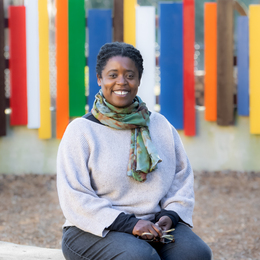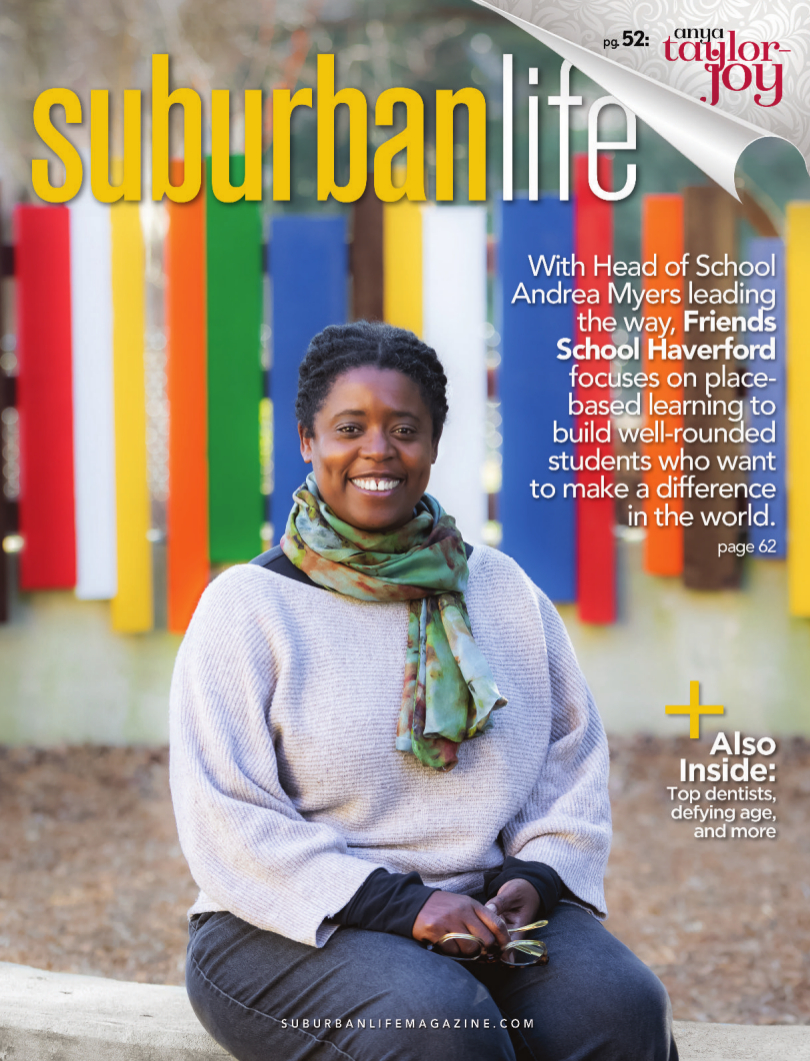
Progressive Thinking
With Head of School Andrea Myers leading the way, Friends School Haverford focuses on place-based learning to build well-rounded students who want to make a difference in the world.
Long before Andrea Myers was breaking barriers as the first African-American head of school in the 138-year history of Friends School Haverford, she knew she wanted to be involved in progressive education. In fact, her interest goes all the way back to her first job out of Hampton University in Virginia, when she initially recognized the benefits of such a model.
As a museum educator at Phillips Academy-Andover in Massachusetts, she treasured opportunities to engage students who visited the art gallery and converse with them about the pieces they saw and the history behind them.
“Typically, at the end of those school visits I would talk to the teacher,” she recalls. “Inevitably the children who participated the most during the sessions were often described as the difficult students who were not interested in learning, and it seemed the polar opposite to what I was seeing. I wondered if children could have a different experience in school and we could engage them in a different way.”
Myers went back to school to receive her graduate degree in education and eventually landed at The Miquon School in Conshohocken. She spent 12 years as Miquon’s director of admissions and financial aid, and became further immersed in progressive concepts. After receiving an MBA from Temple University, she decided to seek an opportunity to utilize those additional skills. She joined Friends School Haverford last year.
Rooted in the principles of the Religious Society of Friends—or Quakers—Friends School Haverford serves children in nursery school through fifth grade, promoting intellectual curiosity, individual creativity, respect for everyone, and service.
“Quaker schools value the individual pursuit for knowledge as well as working together to create a healthy community,” Myers says. “That was also true at many progressive schools where I’ve worked, so there are a lot of correlations. For me, this tenet of being actively engaged, asking questions, thinking critically, and having dialogue is important. The spiritual element was different, and very intriguing for me personally but also felt like an important area of exploration for me as a leader.”
At the core of Friends School Haverford’s philosophy is the concept of place-based learning, which incorporates the community’s local heritage, culture, and experiences as the foundation for the study of traditional subjects such as math, science, language arts, and social studies. The school also sets forth its values with the acronym S.P.I.C.E.S., which stands for stewardship, peace, integrity, community, equality and equity, and simplicity.
“Those principles are embedded in all that we do,” Myers says. “They’re embedded in the curriculum, and they inform the books that we read and the way we engage with children.”
Through the place-based learning model, Friends School Haverford students take field trips and spend time working with people within the community. They also take advantage of nearby Haverford College, where they often visit the farm and arboretum.
“It’s a beautiful way of fully integrating the subjects in our work,” Myers says. “It starts small. The younger children explore their immediate environment and their families, and as they get older, they learn about their school and classroom community. From there, they learn about the neighborhood and the community that surrounds them. As they reach third, fourth, and fifth grade, they study themes of the national and global world.
“What I love about this approach,” she continues, “is that it embeds the values in the work, and it allows students to practice and become caring humans. We are discussing these topics in abstract ways but also living them. It’s been exciting to see teachers lead these explorations and studies, and also see how children’s interesting questions inform the studies as well.”
Diversity and inclusion are also stressed in the school, which welcomes people of all faiths, including non-believers. Students meet and become friends with children of different races, backgrounds, and cultures.
That’s why Myers’ appointment as head of school was so important, to reflect the diversity that is at the heart of the school. She has received guidance from other heads of school of color in similar positions within the Friends Council on Education, the overarching organization that supports and promotes Quaker education.
“It’s an important point in history for the school, but I also feel that Quaker schools in general have a history of being trendsetters and trailblazers in that way,” she says. “So I feel lucky to have that support while starting this journey. It is important for all children to see that people of color are leaders in so many different places.”
Myers envisions being in her role for years to come. She is particularly excited about future projects such as the return of the school’s summer day camp and its Spanish program. She also looks forward to sending well-rounded students to a wide range of respected public and private institutions after their graduation from Friends School Haverford.
“The schools appreciate what our students bring, which is a desire to be part of a community and be a positive community member,” she says. “They’re very inclusive in the ways they think about friendship and their peer group, and they’re wonderful contributors to the school community. They come with solid skills and can transition well.”
Friends School Haverford
851 Buck Lane
Haverford, PA 19041
(610) 642-2334
friendshaverford.org
851 Buck Lane
Haverford, PA 19041
(610) 642-2334
friendshaverford.org
Photo by Nina Lea Photography
Published (and copyrighted) in Suburban Life magazine, January 2023.



